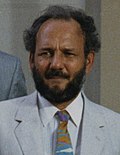| |||||||||||||||||||||||||||||||
13 of 21 seats in the House of Assembly 7 seats needed for a majority | |||||||||||||||||||||||||||||||
|---|---|---|---|---|---|---|---|---|---|---|---|---|---|---|---|---|---|---|---|---|---|---|---|---|---|---|---|---|---|---|---|
| Turnout | 88.81% ( | ||||||||||||||||||||||||||||||
| |||||||||||||||||||||||||||||||
 Results by constituency | |||||||||||||||||||||||||||||||
| |||||||||||||||||||||||||||||||
General elections were held in Saint Vincent and the Grenadines on 25 July 1984. [1] The result was a victory for the New Democratic Party, which won nine of the thirteen seats. Voter turnout was 89%. [2]

